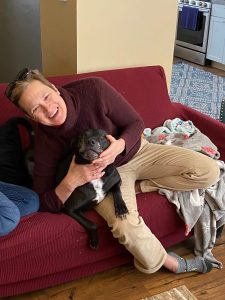A Year In: Students and Faculty Respond to the Pandemic
April 30, 2021
For over a year, the Coronavirus has impacted the world and our individual lives in countless ways. From the mandatory lockdowns early last year, to where we are now with vaccines rolling out and guidelines becoming less strict, the world we were once used to has drastically changed.
One of the largest changes that has been faced over the course of the COVID-19 pandemic is how the virus and safety guidelines have affected the education system.
From the outside looking in, it may be easy to assume that students would enjoy learning from home. The truth is, though, that students’ learning overall has been impacted negatively since the start of the pandemic.
A study done on student success during the pandemic by Bookings.edu stated that “Student achievement was lower than the pre-COVID-19 performance by same-grade students in fall 2019, and students showed lower growth in math across grades 3 to 8 relative to peers in the previous, more typical year.”
As mentioned, the coronavirus has impacted students’ learning and it still does as we as a society find new ways to adapt to the world we are now living in.
The pandemic has not only affected students, but also school staff and faculty, even close to home.
IVCC Professor Richard Mangold and former IVCC student Rosanna Stremlau gave us their stories and experiences on how the current global health crisis has affected them and their teachings and education.
Professor Richard Mangold teaches psychology and sociology courses at IVCC. He had to transition last year to online classes along with all of the other students and faculty. Mangold gave his insights as to how he coped with the transition.
When asked about what was some of the most challenging aspects of moving from in person teaching to online, he said, “The most difficult changes are the fact that we have NO face interaction with students, which is such a big part of working in the field as a therapist and the fact that it is nearly impossible to do exams online.”
Mangold also had difficulties with Blackboard when the transition first began and explained, “For me it was challenging because I did not use the Blackboard Management System, so I had to learn it. I am still getting better at it and teaching has been much easier.”
During the worst parts of the pandemic and ongoing, Mangold volunteers at the vaccination clinic at IVCC. He received his Moderna vaccination recently for COVID-19 and encourages students and faculty to do the same.
Mangold gave insight as to why he volunteered and said, “The pandemic has been a great equalizer in the sense that it affects everyone rich or poor, old, or young, left or right and gives me the feeling that we are all in this together. That is part of the reason for my decision to volunteer.”
He commended medical professionals and said, “The LaSalle County Health Department has done a great job of responding to this pandemic. Us volunteers and the LCHD have learned a lot about the logistics of a massive response to public health crises and will help in response to future crises.”
Mangold is concerned about the lasting effects that COVID-19 will have on people’s mental health.
He said, “I think, on a more serious note, that anxiety, depression, stress, and other symptoms are exacerbated during the pandemic and we are likely to see some of the ripple effect of this for years.”
Along with everyone else, he was affected by the pandemic regarding missing time with friends and family.
Some positive outcomes of the pandemic for Mangold include new hobbies such as woodworking and hiking. He has also had more quality time to spend with his wife.
When Rosanna Stremlau found out last year that class was going to be online she said she was one word: disappointed. Stremlau said that she was upset that she would not be able to attend class in person, as she had really enjoyed her re-entry into academics.
As classes moved online, she found that it was very challenging. She felt that the instructors struggled with how to appropriately present the information in an online setting and she felt a lack of connection, both with the material and with the other students and the instructor.
Stremlau decided that she would try to attend a fall class and found herself disappointed once more in the learning outcome she received. She felt discouraged by the amount of feedback she received from the instructor saying “you cannot convince me that sending an email once a week is teaching.”
Still unsure if she will enroll in the fall, Stremlau says that it will depend on the curriculum available. When she viewed the courses available for the spring, she was disheartened to see that many of the classes that she had been interested in had been removed; a move Stremlau hopes is only temporary.
Stremlau says that the biggest thing that she will take with her from the pandemic is structure.
She says “I have always known the importance of structure, but what I have done lately is to create a more complete schedule which I follow.”
Not currently enrolled at IVCC, Stremlau volunteers at the Bureau County Historical Society.


